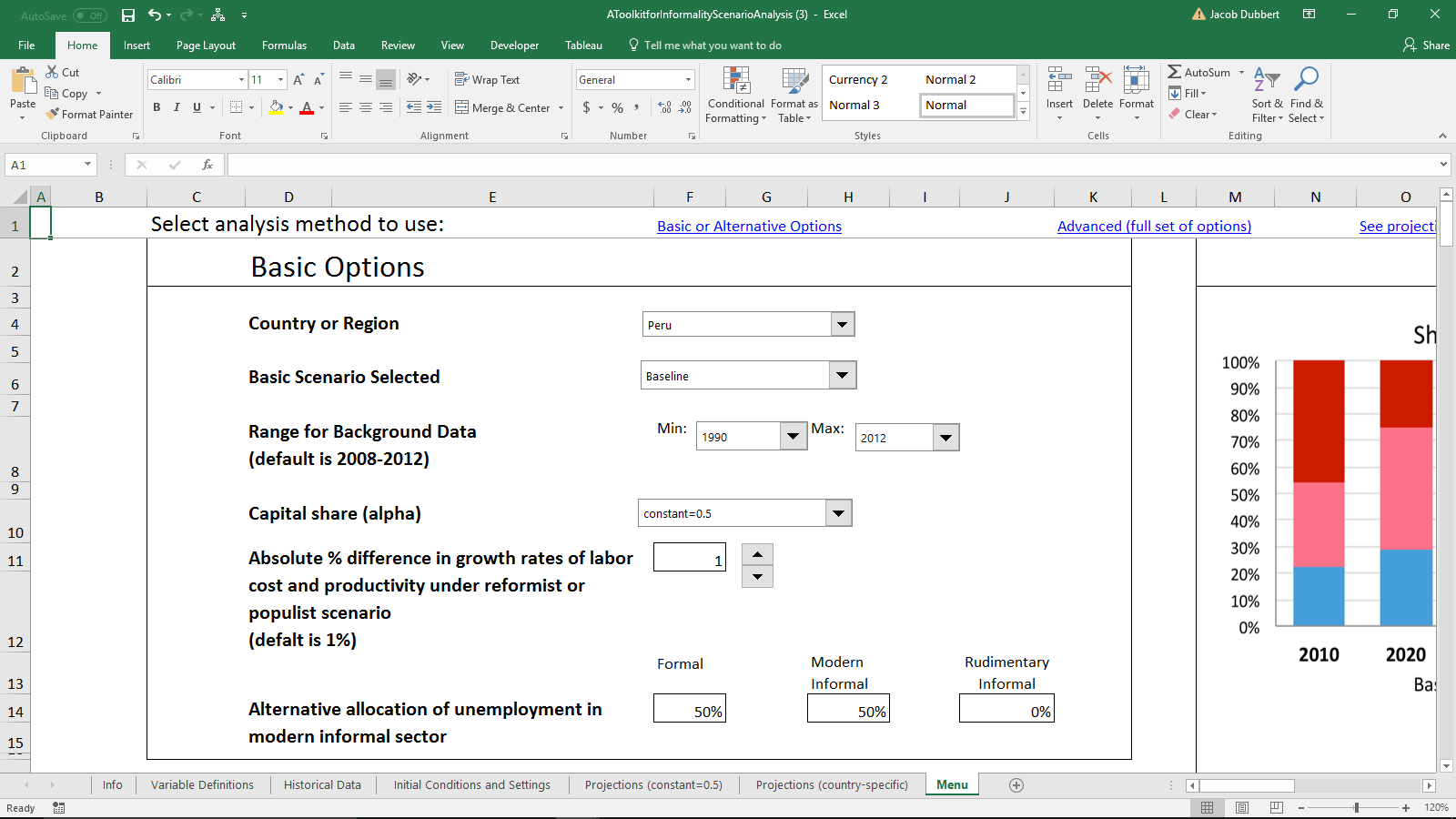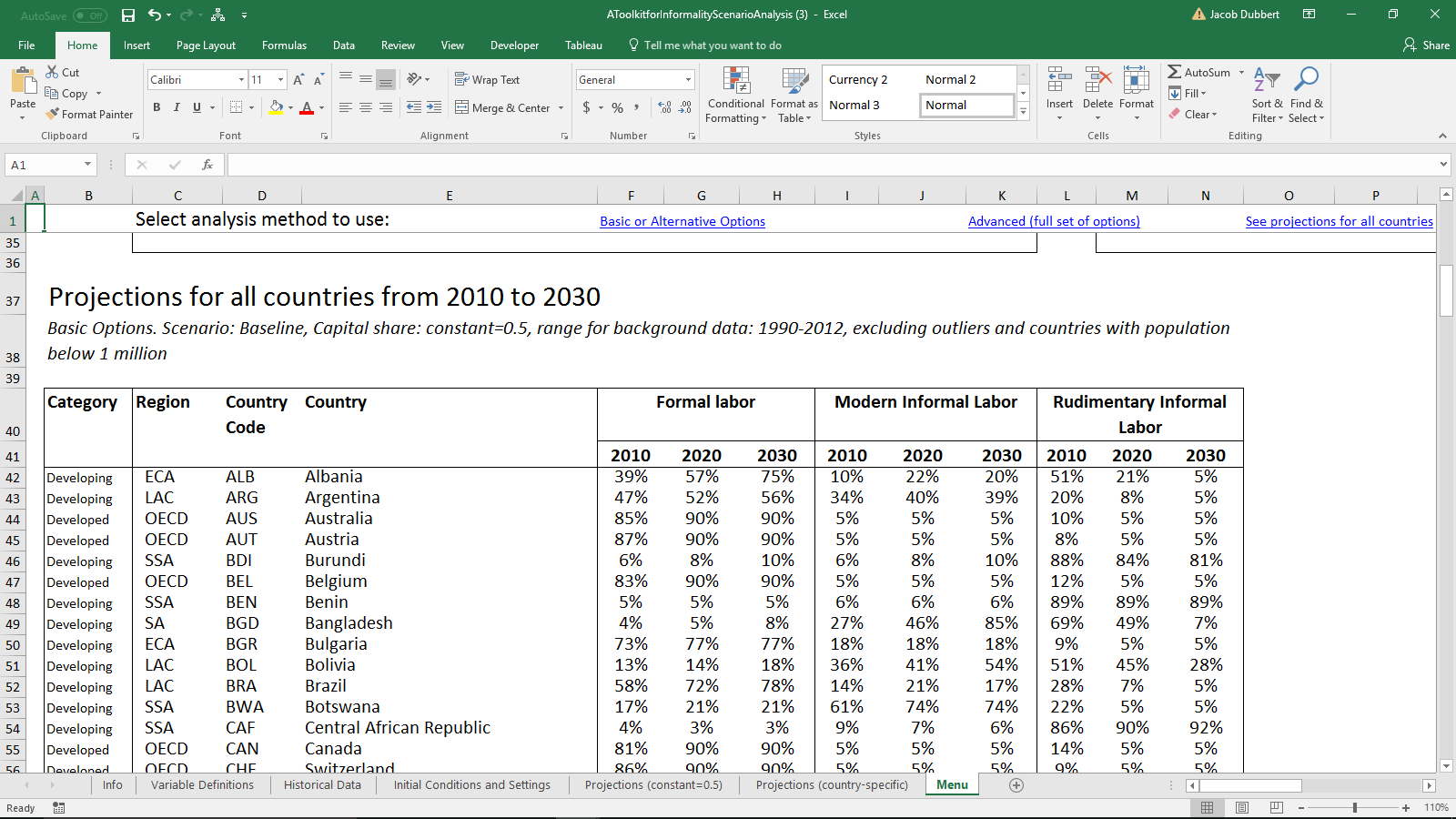ILO: Difference between revisions
JakeDubbert (talk | contribs) No edit summary |
JakeDubbert (talk | contribs) No edit summary |
||
| Line 27: | Line 27: | ||
These can be found within the Toolkit spreadsheet, on the user-friendly Menu tab. The options we are concerned with are: '''Basic Scenario Selected ('''Baseline/Reformist) and '''Range for Background Data '''(earliest to most recent). | These can be found within the Toolkit spreadsheet, on the user-friendly Menu tab. The options we are concerned with are: '''Basic Scenario Selected ('''Baseline/Reformist) and '''Range for Background Data '''(earliest to most recent). | ||
[[File:Informal labor 1.png]] | [[File:Informal labor 1.png|RTENOTITLE]] | ||
| Line 33: | Line 33: | ||
A summary of the Formal labor and Modern Informal Labor projections for all countries can be found at the bottom of the page. | '''A summary of the Formal labor and Modern Informal Labor projections for all countries can be found at the bottom of the page.''' | ||
[[File:Informal labor 2.png]] | |||
[[File:Informal labor 2.png|RTENOTITLE]] | |||
| | ||
Revision as of 19:38, 28 September 2017
ILO Data series
World Bank: Loayza Informal Labor Forecasts
The informal labor forecast series uses the “Toolkit for Informality Scenario Analysis”, created by Norman Loayza, to code information on forecasts for the formal and modern informal labor sectors for 96 countries, and covers the years 2010, 2020 and 2030. The projections are based on the model described in Loayza (2016) “Informality in the Process of Development and Growth,” Policy Research Working Paper WPS7858, World Bank. In the tool, the labor force is allocated into three sectors: the formal sector, the modern informal sector, and a rudimentary informal sector. The aim of the tool is to allow users to generate estimates of the size and evolution of informal labor, using historical data and exogenous projections from the ILO and World Bank, as well as estimates of key parameters from the literature.
IFs has drawn primarily on their forecasts for the formal labor and modern informal labor sector.
Loayza, Norman. 2016. Informality in the Process of Development and Growth. Policy Research Working Paper no. WPS7858. Washington, D.C.: World Bank Group. http://documents.worldbank.org/curated/en/998481476291165295/Informality-in-theprocess-of-development-and-growth
Instructions on Importing Informal Labor Forecast data into IFs:
This section explains the methodology that is to be followed when importing Informal Labor forecast data from Loayza into IFs. It also describes certain problems that a user might face in interpreting and understanding the data.
Source: Informal labor data is published by The World Bank. The data is available at this website, https://data.worldbank.org/data-catalog/informality-scenario-analysis
Types of data: Following categories of data need to be imported into IFs:
1.Baseline Formal Labor Forecast-Labor productivity grows at the same rate as labor costs in the formal labor sector
2.Reformist Formal Labor Forecast-Labor productivity grows at a faster rate than labor costs in the formal labor sector
3.Baseline Informal Labor Forecast- Labor productivity grows at the same rate as labor costs in the informal labor sector
4.Reformist Informal Labor Forecast- Labor productivity grows at a faster rate than labor costs in the informal labor sector
These can be found within the Toolkit spreadsheet, on the user-friendly Menu tab. The options we are concerned with are: Basic Scenario Selected (Baseline/Reformist) and Range for Background Data (earliest to most recent).
A summary of the Formal labor and Modern Informal Labor projections for all countries can be found at the bottom of the page.

